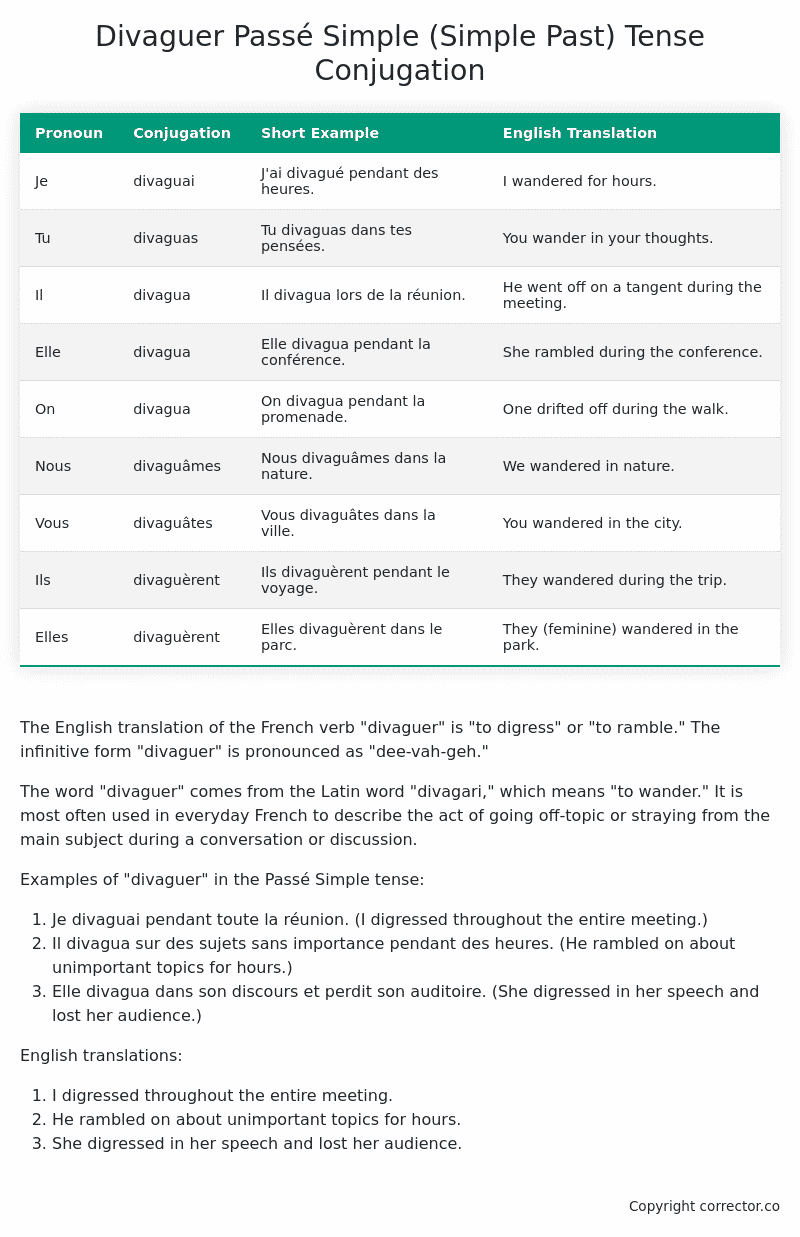Passé Simple (Simple Past) Tense Conjugation of the French Verb divaguer
Introduction to the verb divaguer
The English translation of the French verb “divaguer” is “to digress” or “to ramble.” The infinitive form “divaguer” is pronounced as “dee-vah-geh.”
The word “divaguer” comes from the Latin word “divagari,” which means “to wander.” It is most often used in everyday French to describe the act of going off-topic or straying from the main subject during a conversation or discussion.
Examples of “divaguer” in the Passé Simple tense:
- Je divaguai pendant toute la réunion. (I digressed throughout the entire meeting.)
- Il divagua sur des sujets sans importance pendant des heures. (He rambled on about unimportant topics for hours.)
- Elle divagua dans son discours et perdit son auditoire. (She digressed in her speech and lost her audience.)
English translations:
- I digressed throughout the entire meeting.
- He rambled on about unimportant topics for hours.
- She digressed in her speech and lost her audience.
Table of the Passé Simple (Simple Past) Tense Conjugation of divaguer
| Pronoun | Conjugation | Short Example | English Translation |
|---|---|---|---|
| Je | divaguai | J’ai divagué pendant des heures. | I wandered for hours. |
| Tu | divaguas | Tu divaguas dans tes pensées. | You wander in your thoughts. |
| Il | divagua | Il divagua lors de la réunion. | He went off on a tangent during the meeting. |
| Elle | divagua | Elle divagua pendant la conférence. | She rambled during the conference. |
| On | divagua | On divagua pendant la promenade. | One drifted off during the walk. |
| Nous | divaguâmes | Nous divaguâmes dans la nature. | We wandered in nature. |
| Vous | divaguâtes | Vous divaguâtes dans la ville. | You wandered in the city. |
| Ils | divaguèrent | Ils divaguèrent pendant le voyage. | They wandered during the trip. |
| Elles | divaguèrent | Elles divaguèrent dans le parc. | They (feminine) wandered in the park. |
Other Conjugations for Divaguer.
Le Present (Present Tense) Conjugation of the French Verb divaguer
Imparfait (Imperfect) Tense Conjugation of the French Verb divaguer
Passé Simple (Simple Past) Tense Conjugation of the French Verb divaguer (You’re reading it right now!)
Passé Composé (Present Perfect) Tense Conjugation of the French Verb divaguer
Futur Simple (Simple Future) Tense Conjugation of the French Verb divaguer
Futur Proche (Near Future) Tense Conjugation of the French Verb divaguer
Plus-que-parfait (Pluperfect) Tense Conjugation of the French Verb divaguer
Passé Antérieur (Past Anterior) Tense Conjugation of the French Verb divaguer
Futur Antérieur (Future Anterior) Tense Conjugation of the French Verb divaguer
Subjonctif Présent (Subjunctive Present) Tense Conjugation of the French Verb divaguer
Subjonctif Passé (Subjunctive Past) Tense Conjugation of the French Verb divaguer
Subjonctif Imparfait (Subjunctive Imperfect) Tense Conjugation of the French Verb divaguer
Subjonctif Plus-que-parfait (Subjunctive Pluperfect) Tense Conjugation of the French Verb divaguer
Conditionnel Présent (Conditional Present) Tense Conjugation of the French Verb divaguer
Conditionnel Passé (Conditional Past) Tense Conjugation of the French Verb divaguer
Conditionnel Passé II (Conditional Past II) Tense Conjugation of the French Verb divaguer
L’impératif Présent (Imperative Present) Tense Conjugation of the French Verb divaguer
L’impératif Passé (Imperative Past) Tense Conjugation of the French Verb divaguer
L’infinitif Présent (Infinitive Present) Tense Conjugation of the French Verb divaguer
L’infinitif Passé (Infinitive Past) Tense Conjugation of the French Verb divaguer
Le Participe Présent (Present Participle) Tense Conjugation of the French Verb divaguer
Le Participe Passé (Past Participle) Tense Conjugation of the French Verb divaguer
Struggling with French verbs or the language in general? Why not use our free French Grammar Checker – no registration required!
Get a FREE Download Study Sheet of this Conjugation 🔥
Simply right click the image below, click “save image” and get your free reference for the divaguer Passé Simple tense conjugation!

Divaguer – About the French Passé Simple (Simple Past) Tense
Formation
Usage
Narration
Historical Context
Interactions with other tenses
Passé Composé
Imparfait
Conditional and Subjunctive
Summary
I hope you enjoyed this article on the verb divaguer. Still in a learning mood? Check out another TOTALLY random French verb conjugation!


